
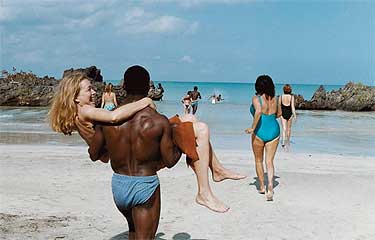
Zanzibar grapples to protect children from abuse
The United Nations Children Fund is working with the Zanzibar government to eliminate child abuse in the rich tourist island in the Indian Ocean coast.
Rich in beach tourism, Zanzibar has been rated among African destinations haunted by “sexcapades” from Europe, Africa and South East Asia.The Island had in recent years reported an increase on children abuse in different forms, from family to institutional levels.
Tourist hotels are mentioned among institutions known for gearing sexual and child abuse in the island.
Zanzibar government is now looking for financial and technical support from United Nations agencies and other donors to help the island fight gender-based and child abuse violence rampant in the island.
Zanzibar Minister for Labour, Women and Children Maudline Castico recently launched a five- year National Action Plan looking to end rampant abuse to children and women in the island.
Through support from UN agencies, the Zanzibar government is looking to implement a five-year plan aimed to protect children the island and said his semi-autonomous government will ensure that women and children are highly protected from gender and child violence. The program will cost about a US$ 20 million.
The UN agencies had raised a concern over rampant child abuse where child abuse affects two out of three children born in the island. The UN report says that 6 out 10 boys and 7 out of 10 girls had experienced violence through different forms in the island.
UN says that child abuse in Zanzibar has been connected with abuse and violence against women where one (1) out of nine (9) women have been sexually abused.
Zanzibar President Dr. Ali Mohammed Shein said through a statement that his government will work out to end violence against children and women by imposing laws and legislations leading to tough punishment against violence perpetrators.
“Violence is a daily reality for significant numbers of women and children in Zanzibar. The immediate and long term social, health and economic consequences of violence against women and children represent a key challenge to national development”, Dr. Shein said in the statement.
United Nations Children Fund (Unicef) Representative in Tanzania Ms. Manisa Zaman said culture of silence in Zanzibar has been a cause for child abuse where parents kept silent when their children fall victims to torture and physical assaults.
The United Nations World Tourism Organization (UNWTO) had underlined Global Code of Ethics for Tourism, aimed to end exploitation of human beings in any form, especially when applied to children.
“We cannot build the responsible and sustainable tourism sector that we seek without protecting the most vulnerable in our societies. To do so we need effective tools and a global commitment,” said UNWTO Secretary-General, Dr Taleb Rifai in July during a meeting which discussed tourism ethics.
“Sexual exploitation in travel and tourism has a child’s face. No country is untouched by this phenomenon and no child is immune,” Dr. Rifai said.
“We cannot build the responsible and sustainable tourism sector that we seek without protecting the most vulnerable in our societies. To do so we need effective tools and a global commitment,” he noted.
The fight against Child Exploitation in tourism is one of the priorities of UNWTO who has been leading since 20 years the World Tourism Network on Child Protection.
UNWTO said that the rise of the Internet and informal operators as well as greater access to international travel have expanded ‘demand’ and heightened the dangers for children. At the same time, grinding poverty and lack of education combined with the continued neglect of child protection systems, all have fuelled children abuse.
In the context of the universal 2030 Agenda for Sustainable Development and the Sustainable Development Goals (SDGs), the International Year aims to support a change in policies, business practices and consumer behaviour towards a more sustainable tourism sector that can contribute to all the 17 SDGs.
Zanzibar is a popular sex tourism destination for European tourists, attracting girls from poor families to engage themselves in sex business. The semi-autonomous island has been dominated by sex workers operating under top secrecy.
The island depends tourism as its main economic artery, banking on its pristine beaches.
In his message to mark the 2017 World Tourism Day, Dr. Rifai said, “Whenever you travel, wherever you travel, remember to respect nature, respect culture and respect your host”.
BY APOLINARI TAIRO, ETN TANZANIA CORRESPONDENT
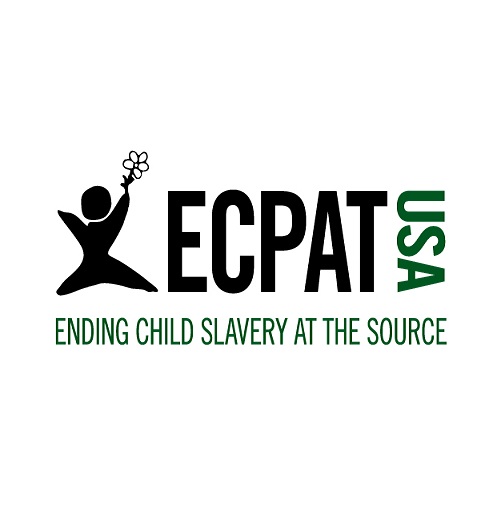
UN General Assembly: A good week to fight sexual exploitation of children
This has been another good week in moving forward on the Recommendations of Global Study on the Sexual Exploitation of Children in Travel and Tourism.
These are the words by Dorothy Rozga Executive Director Ecpat International.
A number of the sections of the Study raise concern about the sexual exploitation of children by UN peacekeepers and other UN personnel. In response, one of the Study’s Recommendations calls “for the UN General Assembly to ensure implementation of the recommendations and to strengthen the UN’s response to sexual exploitation and abuse by United Nations Personnel in the areas of prevention, enforcement, and remedial action….”
An important step was taken in this direction earlier this week when senior officials from fifty-seven countries joined UN Secretary-General Antonio Guterres in a meeting on the sidelines of the UN General Assembly to discuss efforts to end sexual exploitation and abuse in peacekeeping missions around the world. Guterres announced new measures to tackle the problem, including a mandate for investigators to examine allegations within seventy-two hours of a report, bans on alcohol and fraternization for troops, the appointment of the first-ever UN rights advocate for victims, and the establishment of a new accountability mechanism. Seventy-five countries signed or pledged to sign a compact outlining these steps toward curbing the tide of sexual violence.
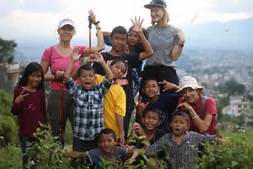
Tourism crimes! Volunteering and visiting Orphanages when traveling
It’s human trafficking, child abuse and a crime participants often don’t even know they are part of it.
It happens in Myanmar, Nepal and other countries. An Australian adventure travel company has a strong stance on child protection and has just announced a new charitable partnership with Australia-based child protection charity Forget Me Not. This reinforces the company’s commitment to end orphanage tourism and help reunite thousands of children with their families. The new partnership is kickstarted with an A$90,000 donation, made through The Intrepid Foundation.
The company removed visits to orphanages from all itineraries by May 2016 and has been working with child protection experts to educate travellers about the reality and implications of supporting overseas orphanages for a number of years. Intrepid is now playing a leading role as part of an advocacy group that is calling for the introduction of a Modern Slavery Act in Australia.
There are 16,886 children living in orphanages in Nepal, yet 80% have at least one parent who could care for them. Many are taken from their home with the promise of a better life, only to be mistreated and abused.
Australian-based charity, Forget Me Not carries out life-changing rescue, recovery and reintegration work, educating rural communities and parents about the dangers of child trafficking and reuniting children with their families in Nepal.
“We believe every child deserves to grow up in a safe and supportive environment. In partnership with organisations like Forget Me Not and Rethink Orphanages, we are actively lobbying the Government to make Australia the first country in the world to declare visits to overseas orphanages as illegal,” James Thornton, CEO of the Intrepid Group explained.
“We are urging Australian travellers and the industry to end orphanage visits and volunteering overseas. Travellers often think they are helping, but children are not a tourist attraction. The best way to help is by supporting organisations that work to keep children with their families – that’s why we have partnered with Forget Me Not,” James Thornton declared.
The $90,000 donation comes from the Namaste Nepal appeal – launched by The Intrepid Foundation following the devastating 2015 Earthquake. The appeal raised over $750,000 in total and is already helping to rebuild a school, provide skills training for women, support a health post near Everest Basecamp and rebuild the heavily damaged Langtang Trekking route in Nepal.
“With the generous support from The Intrepid Foundation, Forget Me Not will be able to assist with the rescue, rehabilitation and family reunions of children who have been trafficked into orphanages for the purpose of profit,” said Andrea Nave CEO Forget Me Not, Australia.
“Together we made it our collective fight to free children and to get them where they belong – back with families, in their villages and in their mountains.” Anju Pun, FMN Country Director, Nepal.
Established by the founders of the Intrepid Group in 2002, The Intrepid Foundation provides travellers with a way to give back to the communities they visit. The not-for-profit organisation has raised over $5.6 million and supports more than 100 community-based projects and initiatives in areas of healthcare, education, gender equality, human rights, child welfare, sustainable development, environmental conservation and wildlife protection.
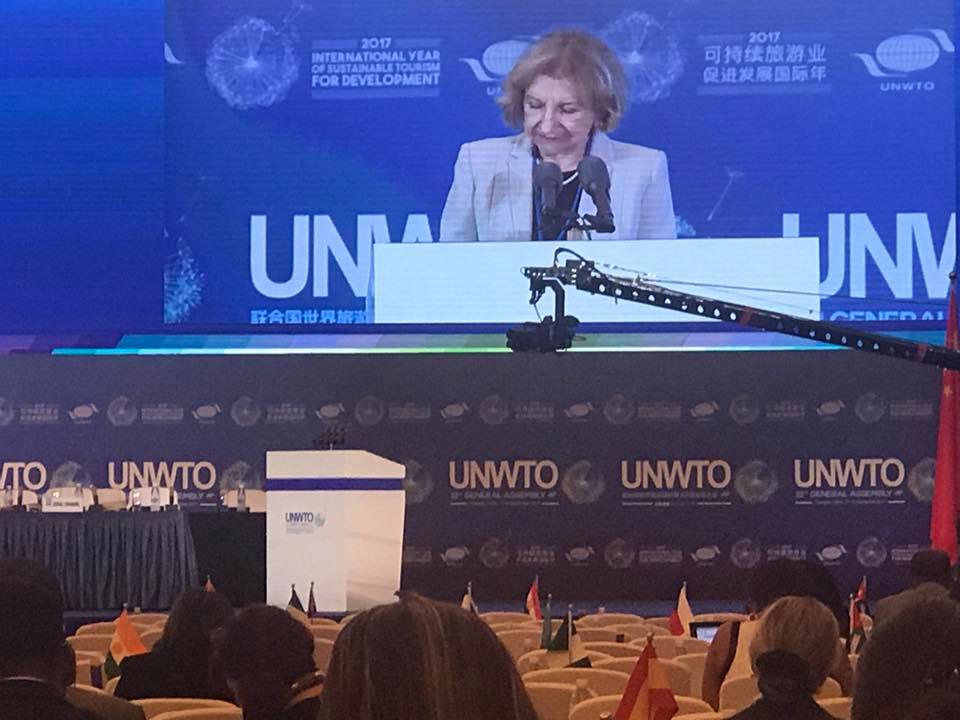
Child Protection & Tourism: Dorothy Rozga, ECPAT speaks at UNWTO General Assembly
At the UNWTO General Assembly in Chengdu, one of the most important issues and problems in the global travel and tourism industry was put in front of delegates and ministers of tourism from 125 countries today.
Addressing UNWTO General Assembly, Dorothy Rozga, Executive Director of ECPAT International, said:
It is a genuine honor to address you on behalf of ECPAT International and the High Level Global Task Force to end the Sexual Exploitation of Children in Travel and Tourism. We are grateful to UNWTO for this opportunity.
I know that the name of the Task Force that I just mentioned casts a negative shadow on the travel and tourism sector. However, I bring a positive and optimistic message. And that message is this: right here, in this hall today, we have the makings of a powerful alliance for the protection of the world’s children. The groundwork has already been laid for the travel and tourism sector to transform into a global leader in child protection.
As we have heard many times over the past few days – the expansion of the travel and tourism sector has multiple economic and social benefits. And many of these carry over to children, bringing positive changes to their lives. Unfortunately, this expansion has also increased opportunities for perpetrators who harm children by sexually exploiting them.
To protect these children, we need to understand this situation within the context of the rapidly evolving state of travel and tourism worldwide.
In response, in 2014, 67 leading organizations and companies from across the world – UN agencies, the private sector, academia, law enforcement and civil society – joined hands in a partnership. And over a two year period, they collectively prepared the Global Study on the Sexual Exploitation of Children in Travel and Tourism. In addition to the global report that summaries almost 3000 pages of research, the Study includes 9 regional reports, 15 country reports and 42 expert papers. It is the largest bank of information ever gathered on this phenomenon.
The Study concluded:
• that the sexual exploitation of children by travelers and tourists has expanded across the globe, out-pacing every attempt to respond;
• that more children are being victimised than ever before; and
• that no country is immune.
We now know there is no typical victim or offender. We know the expansion of internet and mobile technology and the rise of cheap travel means more opportunities to offend. And that means more victims.
To address this situation, the Study makes a series of concrete recommendations for actions to be taken by governments, law enforcement, the private sector, international agencies and civil society. What needs to be done to stop this crime is clear. What is required now is the commitment to act. In particular, Ministries of Tourism need to transform the Study’s recommendations into actions. Child protection needs to be taken into consideration in tourism development plans from the outset.
I’m glad to say that the governments of a number of countries have already convened events or taken steps to implement the recommendations… Ghana, Indonesia, Kenya, Nepal Norway, Poland, Thailand, South Africa, Zambia and Zimbabwe to name a few. In Latin America, the Ministries of Tourism that make up the Regional Group – GARA that is currently chaired by Uruguay are doing outstanding work. And currently a regional plan is being developed by the South Asia Initiative to End Violence against Children (SAIEVAC)for the SAARC countries. Looking ahead, the Government of Colombia has expressed interest in hosting, in 2018, an International Summit on child protection in the travel and tourism sector.
Notwithstanding this progress, much needs to be done. There are children in every country. Travel and tourism reaches every country. Thus actions are required in every country.
Ladies and Gentlemen, during the course of this Assembly, much has been said about the Sustainable Development Goals. As has been observed, it is difficult to find an SDG target that would not, in some way, benefit from the positive energy and support of the travel and tourism sector. This includes the three SDG targets that specifically call for an end to child sexual exploitation.
We need to more clearly recognise and understand the links between the three SDG targets the call for sustainable development of tourism and the three SDGs targets related to child protection. They are mutually reinforcing.
If governments and industry gets the protection of children right, we will no longer have to worry, or feel ashamed, or try to quickly change the subject when this issue is raised. We will be rid of this scourge…..and even the poorest and most vulnerable families will be enjoy the opportunities presented by tourism without fear – and we all live up to UNWTO’s motto – “Travel, enjoy, respect.”
Thank you for your kind attention
Special appreciation is extended to the Dr. Taleb Rifai for his courage to allow this difficult subject to be presented to the General Assembly.
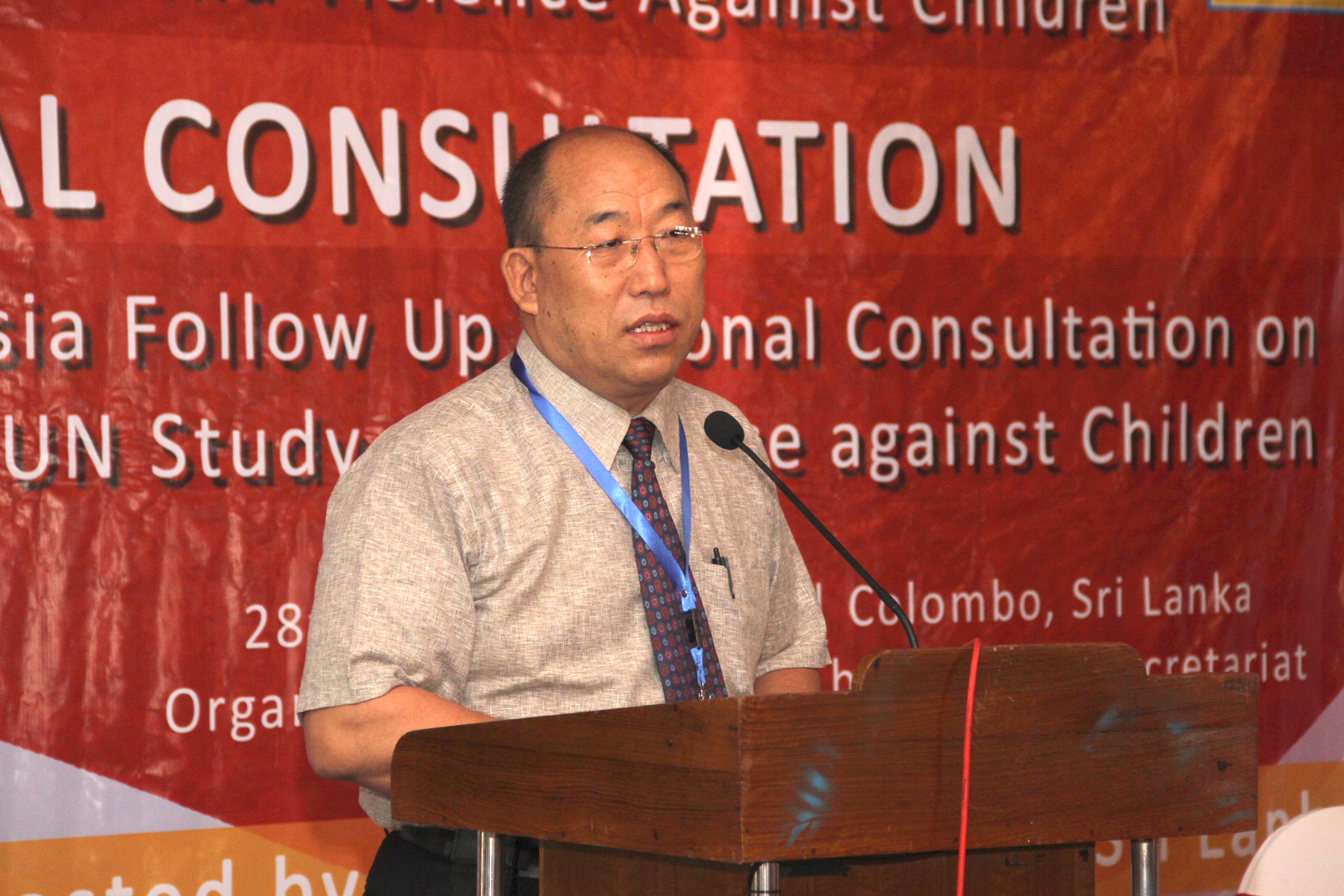
South Asia Initiative to End Violence Against Children addresses UNWTO forum
Dr. Rinchen Chophel, director general of the South Asia Initiative to End Violence Against Children (SAIEVAC) addressed the Global Study High-Level Working Group on sexual exploitation of children through tourism meeting in Madrid by VIDEO. He was unable to attend because of Spanish Schengen Visa difficulties.
Dr. Chophel said:
I convey my humble greetings to all of you who are gathered here today in our common mission to create a safer and happier world for the children of the world. It is my misfortunate that I could not make it to this important gathering despite my deepest wishes.
The South Asia Initiative to ENd Violence Against Children (SAIEVAC) is the South Asian response to the global call by the UN Secretary to End Violence Against Children. SAIEVAC is the only SAARC Apex Body for Children since the 17th. SAARC Summit in 2011 and also a member of the Global Partnership since February 2017.
SAIEVAC I believe is the only inter-governmental body in the world that has created in its governance structure an inclusive platform for children, civil society organizations, and UN/INGO partners to collectively drive the South Asian movement to end violence against children… and create a better world for children in the SAARC Region. The mandate of SAIEVAC is to employ a system-building approach to strengthen child protection across the region and address five key thematic areas (child marriage, corporal punishment, child labor, sexual abuse and exploitation of children and child trafficking) with CHild Participation, disability, and gender as cross cutting themes.
The 4th SAIEVAC Ministerial Meeting held in May 2016, hosted by the Government of India and SAIEVAC Regional Secretariat was an important milestone for SAIEVAC. The meeting took the opportunity to review the 10 Years of the Global Study, 10 years of the SAF/ SAIEVAC Journey and the 20 years of the Global Congress on CSEC. As a special consideration, ECPAT was invited as a full-fledged delegation to the meeting.
The Ministerial meeting after taking serious cognizance of the situation of CSEC in the region, among many key related decisions endorsed that.
- A regional strategy should be developed for addressing all forms of sexual abuse, exploitation (including online) and trafficking that also builds on the existing situations in the different member states, that will guide SAIEVAC while developing the second five-year plan.
- SAIEVAC should initiate a process for settings regional standards and codes of conduct that safeguard children from commercial sexual abuse and exploitation in travel and tourism
- SAEVAC regional and national mechanisms explore opportunities to mainstream and scale up efforts to address sexual exploitation and abuse of children including trafficking by tapping into potential opportunities for technical and financial support.
Between then and now, much has been made to operationalize the above decisions. Notably, among the activities undertaken, I want to highlight the following:
- Initial Draft of the Regional Strategy on CSEC and Online Safety (OS) developed in close partnership with ECPAT International, selected experts for partners in South Asia, SAARC Secretariat and the SAIEVAC Mechanisms (since July 2016)
- A regional Children’s Consultation held in December 2016 on CSEC & OS in partnership with Plan supported CSO projects and ECPAT.
- A SEIEVAC Interfaith discourse held on the draft Strategy in December 2016
- A background document on the situation of CSEC&OS in the SAARC Member states is at an advantage stage of finalization in partnership with ECPAT.
- Ongoing efforts to set up a Regional Coalition of like minded partners on CSEC & OS to support the regional efforts of SAIEVAC.
With the critical support from the Global Fund/WeProtect and ongoing collaboration with ECPAT and other key partners, SAIEVAC will be organizing the Regional Expert Group Meeting to review Regional Strategy in the 3rd of August 2017, besides a series of national level consultations in selected countries including a review of the legal and policy environment in the region.
With the complementary ongoing effots from ECPAT Internationa and its network partners as well in different countries, I have every reason to feel confident that we will make a significant difference in the coming years.
However, SAIEVAC will need to raise additional resources to sustain this momentum and further energize the next (5th) ministerial meeting in terms of greater political convergence and ownership on CSEC & OS.
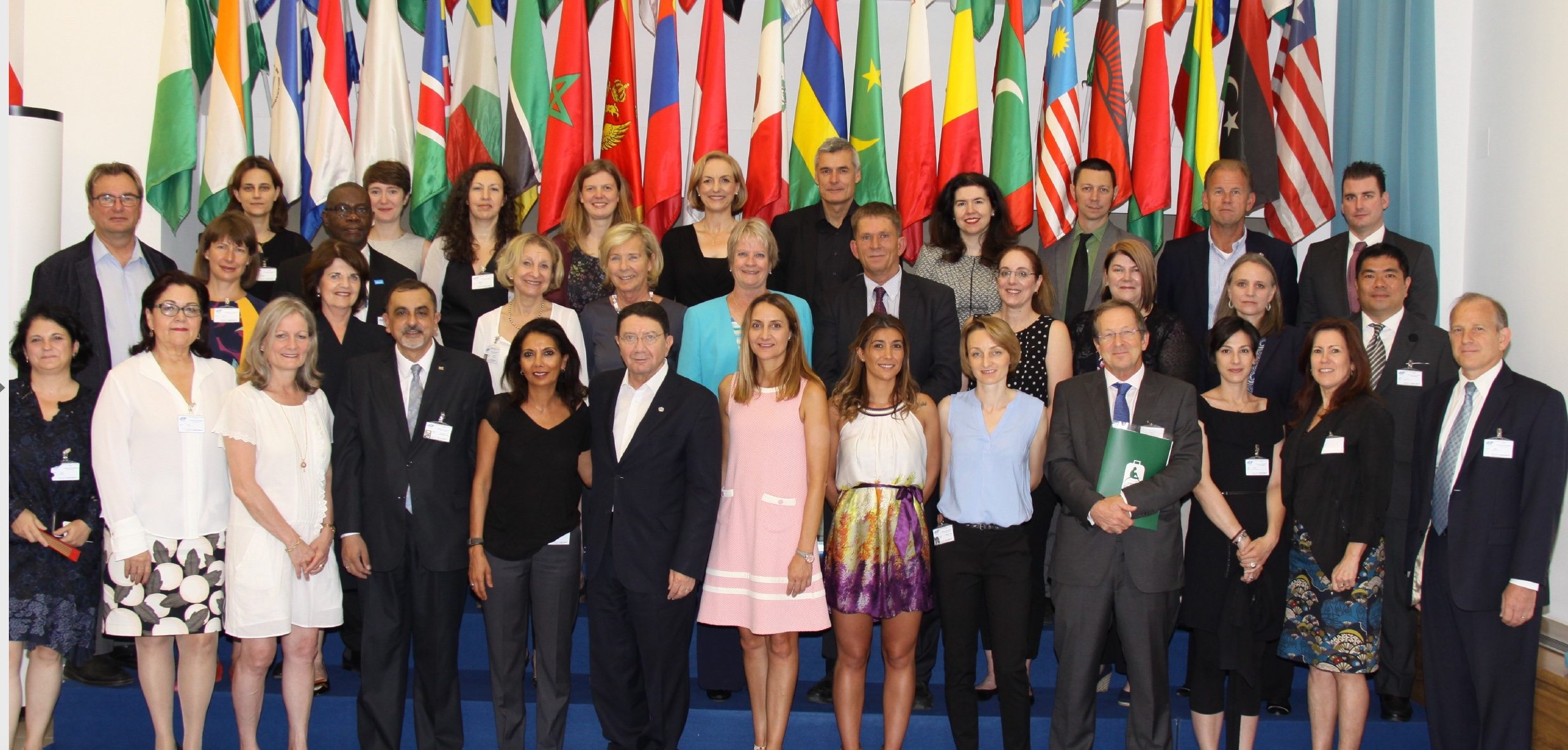
Leaders unite to stop global sexual exploitation of children through travel and tourism
A combination of weak child protection systems, cheap international travel, and growing access to the internet is thwarting efforts to counter the sexual exploitation of children in the travel and tourism industries, a conference on the issue in Madrid this week concluded.
Hosted by the United Nations World Tourism Organization (UNWTO), the meeting of international experts and officials was supported by the government of The Netherlands, UNICEF, the Global Partnership to End Violence against Children, ECPAT International and the High Level Task Force for the Global Study on Sexual Exploitation of Children in Travel and Tourism. Najat Maalla M’jid is the Chair of this Taskforce, which guided the development of the Global Study, and she set the scene for the meeting by stridently declaring, “Sexual exploitation in travel and tourism has a child’s face. No country is untouched by this phenomenon and no child is immune. In this International Year of Sustainable Tourism for Development, let us place children’s right to protection from violence and exploitation at the heart of our actions,”
“We cannot build the responsible and sustainable tourism sector that we seek without protecting the most vulnerable in our societies. To do so we need effective tools and a global commitment” said UNWTO Secretary-General, Taleb Rifai.
Delegates heard that the rise of the Internet and informal operators as well as greater access to cheap international travel have expanded demand and heightened the risk of children beng sexually exploited. At the same time, grinding poverty and lack of education – combined with the continued neglect of child protection systems – have fuelled the supply of children.
In addition, a chronic lack of robust data is allowing offenders to commit their crimes in the shadows and with impunity, while the capacity to respond internationally and nationally is being outpaced.
The UNWTO is expected to ask its General Assembly to approve a new international convention on sustainable tourism in September, with the inclusion of provisions for the protection of children.
The Special Rapporteur on the sale of children and sexual exploitation of children, Maud de Boer Buquicchio, called for, “Child protection to be placed at the core of tourism development strategies.”
UNICEF – a global leader in child protection – emphasised the need for coordinated action. “All of us — from families and governments…to hotel workers, taxi drivers and airline staff…to tour operators and telecommunications companies…to police forces…to UN agencies and NGOs — we all have a responsibility to do all we can to end this monstrous violation of children’s rights…children’s safety…and children’s futures,” said UNICEF Executive Director, Anthony Lake. “It’s everybody’s business to end the business of children being exploited and abused.”
Interpol is releasing improved tools to significantly reduce the possibilities for known sex offenders travelling unnoticed internationally.
Peter van Dalen, from Interpol’s Organized & Emerging Crime Directorate, based in Lyon said, “Anonymity protects traveling sex offenders, and INTERPOL is working with countries to deprive known sex offenders’ of their anonymity, through mechanisms such as an international warning system sharing information across borders about convicted sex offenders, as well as an international vetting system for job applicants applying to working with children.”
The private sector has been closely involved, motivated by the need to combat practices that can seriously affect their reputation and their revenue. ECPAT International is calling for travel and tourism operators to join the “The Code,” a travel industry initiative to stop sexual exploitation of children. Some of the largest players in travel are members.
Head of CSR for RIU hotels – which is a member of The Code – Catalina Alemany-Sorrell championed the commitment of the family owned international hotel chain, “Large companies in the tourism and travel industry have a greater responsibility to the communities where we operate, precisely because of our capacity for influence and transformation. For this reason, we need our commitments to send signals to society that this problem will not be tolerated and that above all, we will fight for a world where children are free from abuse.“
The challenge now is to expand coordinated action to implement the recommendations of last year’s study which called for law enforcement, the private sector and civil society organizations to work together.
The Special Representative of the UN Secretary-General, Marta Santos Pais, encouraged strong linkages with global processes, saying: “The 2030 Agenda for Sustainable Development presents a unique opportunity to reverse this pattern and make all forms of violence against children part of our distant past.

Impact-Travel Company Triip.me signs UNWTO’s Private Sector Commitment to the Global Code of Ethics for Tourism.
Sri Lanka, 20 MAY, 2017 – Triip.me signed the United Nations World Tourism Organization’s (UNWTO) Private Sector Commitment to the Global Code of Ethics for Tourism in a signing ceremony today in Sri Lanka. Triip is the first Singaporean company to do so.
Formulated in 2011, The Commitment has been signed by 513 companies and associations as of May 2017. Its main objective is a promise by signatories to focus on issues such as human rights, social inclusion, gender equality, accessibility, and the protection of vulnerable groups and host communities in the course of their daily business.
“For Triip, this is both an honor and a serious commitment. Solving the issues outlined by the Code of Ethics for Tourism is why we exist. From day one our business model has created barrier-less access to the global tourism economy, creating thousands of jobs for local guides around the world as a result. Since then, we’ve broadened our impact scope to include working with hotels and other travel providers, leveraging cooperation to further sustainability, cultural and environmental protection, and also protect against the standardisation of destinations,” said Hai Ho, co-founder of Triip.
Founded in 2014, Triip is an impact-travel company dedicated to bringing together local experts and global travelers to create authentic local experiences. As a sharing economy platform, Triip enables passionate locals to become Triip Creators, i.e., create their own private tours to share their passion with travelers, earn money and make new friends – while also offering travelers one-of-a-kind local cultural experiences with real people. The whole process is facilitated by their website and mobile apps. Currently, there are 6,000 local experts in 650+ cities in over 100 countries around the word using Triip, and about 70% are women from low-income countries. By autumn this year, Triip will launch an integration with Booking.com to also offer hotel bookings through the platform alongside the private local tours, thus giving traditional lodging in 227 countries access to authentic, indie tour experiences for the first time ever. Further, a significant percentage of each hotel booking will be automatically given to pre-selected local and global impact partners.
Triip is also extending its impact mission to other business leaders through its CEO/Founder Type-A Retreats in Bhutan.
“As the world’s only carbon negative country, Bhutan is renowned for its practical emphasis on sustainability and happiness,” said Ha Lam, co-founder of Triip “Therefore Triip is exposing as many businesses leaders as possible to this unique country, so that they, too, can more practically build a more sustainable and happy world through their ventures.”
With this new mission as well as its expansion to 700 cities in 2017, Triip hopes to build a network of 1000 Impact hotels within the next two years.
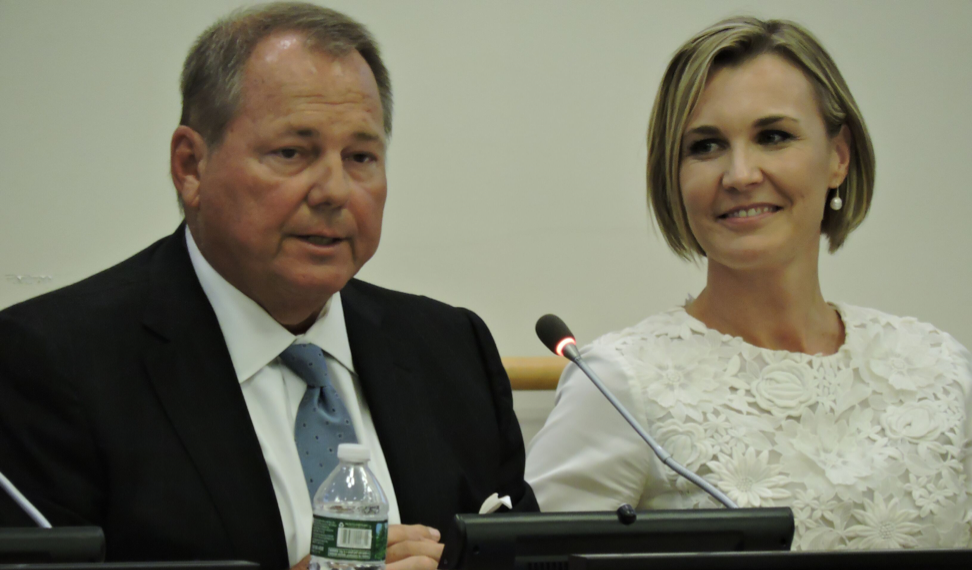
Keeping Children Safe: a success story of the leadership for sustainable tourism.
Hearing Paul Sistare speaking last September at the United Nations and this year at the Global Child Forum and World Childhood Foundation Brasil event in São Paulo was so inspiring. Chairman, Founder and former CEO of Atlantica Hotels in Brazil, Paul has demonstrated what businesses can do to keep children safe and reduce the risks of child abuse and trafficking. It is a sentiment we share at the World Childhood Foundation USA (Childhood USA), an organization with the vision that every child should be free from violence and child sexual abuse and exploitation. We need more champions like Paul, who know how to successfully and in a sustainable way engage their companies, employees, purveyors, clients and guests in doing what each of us should be doing: keeping our children safe. Over the last 12 years, Paul has led the Atlantica Hotels work in partnership with Childhood Brasil to develop and implement a program for prevention of child abuse and exploitation, and raising money for the victims, a program which we believe will inspire all of you to take action.
We want to share Paul’s story to highlight the role of business in child protection, and to demonstrate how a corporate leader can become an agent for change. By partnering with an NGO, such as Childhood, businesses get technical and strategic support and expertise that makes the program scalable and sustainable. With over 1 Billion children every year exposed to violence, and the economic impact of violence against children reaching up to 7 Trillion Dollars, it is urgent that we act NOW.
After a very successful Global Child Forum last month in São Paulo, that was co-organized with Childhood Brasil, Dr. Joanna Rubinstein, President and CEO of Childhood USA, called Paul to interview him to learn how to engage other companies within the travel and tourism industry in ending violence and abuse of children.
JR: Paul, when did you for the first time reflect on child sexual abuse in the travel and hospitality industry?
PS: I have had the privilege of being in the hospitality industry for nearly 45 years and have operated in virtually all the continents of the world. At the very beginning, when I was based in Orlando working for Walt Disney World at the time EPCOT was being opened, I was emotionally overwhelmed with the number of terminally ill children who had said that visiting Disney World was their dying and last wish. This was the beginning of the Make a Wish Foundation where myself, representing Disney and members of the airlines and the Orlando community sought to fulfill these wishes for not only just the children but also the family. A rewarding experience indeed but heart-breaking. I keep to this day, letters and obituaries from the families that I hosted at Disney. Today, the Make a Wish foundation is helping families and their terminally ill children all over the world. One last wish…
Leaving Disney and working for another international firm based in Hong Kong but with over 300 hotels worldwide, I became aware of the number of homeless families during the tumultuous 80’s where particularly in the US, families were forced to live on the streets at no fault of their own. Rather than simply turning away from this problem, I partnered with Habitat for Humanity and challenged my hotel group to build 50 homes across the states and countries we operated. My team took up the challenge and surprised me by exceeding our goal and built 80 homes in one year which attracted the attention of former President Jimmy Carter who invited my wife and I to a lovely dinner at their home to celebrate our involvement with the group.
Arriving in Brasil was an eye opener for me especially because building out Atlantica Hotels into 44 cities in Brasil, I visited many areas that many Brasilians themselves did not know. The one thing I saw in common in all the cities I visited (rich or poor) was the multitude of children on the streets trying to survive. Little did I know at the time that their parents were forcing them to work the streets not only just begging, but even selling their tiny bodies to unscrupulous tourists. As this dawned on me from personal experiences, we created an internal program called “Criança Feliz” to help the street children in the communities where we operated our hotels. It was only a year later that we discovered that although Atlantica was an outstanding hotel operator, we knew nothing about NGOs or charitable organizations. We had amassed a significant sum of money but had no idea as to how to deploy the funds to actually change lives. In 2005, we partnered with Childhood Brasil and the rest is history and now our future.
JR: How did you decide what needs to be done and how to implement it, or who would be the right partners for Atlantica Hotels?
PS: It is said to do what you do best. Atlantica Hotels is the best and largest private hotel operator in Latin America. We know how to clean rooms, attract guests, cook and serve food and make a profit for our clients and shareholders. What we did not know was how to change the lives of the children that were being abused. We realized that the hospitality industry was at the front lines or rather ground zero of the war. We had the means to change lives and expose the issues; but we did not have the infrastructure. The partnership with Childhood Brasil allowed us the freedom to build an infrastructure together while we could focus on our core business while contributing to our community. The associates of Atlantica, with the help of Childhood, began to realize that their jobs at Atlantica had both a role and a purpose not only in the necessity of providing a livelihood for their families but all members regardless of their positions in the hotel could contribute to their community and change lives for the better. The 5,000 members of Atlantica’s team and over 25 million guests readily embraced the concepts with Childhood Brasil. The government was much slower to recognize the problem. However, persistence and consistency paid off and various ministries recognized the value that Atlantica Hotels and Childhood Brasil were implementing in the respective communities. It was good for business and now it was good for the government.
JR: How did you persuade your Board that Atlantica Hotels in Brazil should engage in protecting children from abuse and exploitation?
PS: Persuading and engaging a Board is really not the entity that will have significant impact. Their focus and role is to provide direction and improve shareholder value. They look to the CEO to implement actions to do so. In the tourism industry, engaging with the community is just good business. The question then remains as to how to engage most effectively to raise the profile of the business and achieve the board’s goals.
JR: What major challenges did you encounter and how did you overcome them?
PS: The first challenge was almost overwhelming, as in 2005 we needed to get over 5,000 team members to understand the mission of Childhood and then train them in a sustainable manner. Turnover in the hospitality industry is normally around 50%. So as one individual comes in, one goes out. The challenge was to maintain the momentum. In that challenge, we recruited “mentors” and “champions” in each hotel that adopted the initiatives and kept the team engaged. We quickly found out that these individuals needed to be line level staff who spoke the language of the team.
Secondly, came the government. The Tourism Ministry refused to accept that there was a problem. It was not until I used the words in a speech sanctioned by the President of Brasil that the Ministry backed down. Moreover, 25 million guests and 5,000 people in 44 cities gradually won the government over to create a Childhood Day, a Ministry dedicated to Children and a nationwide program to denounce child abuse, child slavery, child sexual abuse and child tourism. In fact, the government passed a law that now unaccompanied minors must show proof that they have their parents’ permission to be traveling with another adult such as a relative or in school or religious groups.
JR: 2017 is the year of sustainable tourism. Together with the new global goals, the Sustainable Development Goals, it offers new opportunities to address the issue of child abuse and trafficking. Travel and hospitality industry can help to achieve the SDG 16.2 target – ending abuse, exploitation, trafficking and all forms of violence and torture of children by 2030. How can we get other companies and hotel chains to replicate your successes and accelerate progress toward reaching this ambitious goal?
PS: Other tourism industries need to be exposed to the success of Atlantica’s culture and accept that they are at the front lines of a global war. Perhaps it is just winning a battle or two but it is small battles that win a larger war. The realization is that this war is far from being won. But the sustainable actions of creating a culture and not just a program will change the life of one child which becomes a force multiplier.
JR: What are you most proud of and consider your greatest accomplishment?
PS: While the first 2 or 3 years working with Childhood Brasil was challenging, mostly due to my impatient personality, today, we have over 5,000 Atlantica Hotel team members embracing the cause and 25 million guests are aware of Childhood Brasil. We also have 8,000 clients engaged as well as the requirement with our purveyors that in order to do business with us, they have to sign the “Code of Conduct.” We have supported the building of 7 shelters for victims. We have given dignity and respect to those who have been abused. Although being the largest financial supporter of Childhood Brasil could be considered as a great accomplishment, however, money does not ensure sustainability. Today, the Childhood program in Atlantica is fully integrated and is no longer just a program implemented because the CEO “said so.” Today, Childhood is part of the fabric of Atlantica. It is part of the culture of Atlantica. Therefore it is sustainable.
|
|
|
| ATLANTICA HOTELS | |
Founded in 1996 by Paul J. Sistare, Atlantica Hotels, based in São Paulo, Brazil, is the largest privately held hotel management company in South America. Atlantica Hotels maintains exclusive strategic alliances with Choice Hotels, Carlson Rezidor Hotel Group and Hilton. With over 5,500 employees Atlantica Hotels currently operates 87 hotels which total more than 14,500 rooms in 44 cities in Brazil, and more than six thousand hotels around the world in its reservation portfolio. Atlantica Hotels is also one of the largest supporters of Childhood Brasil committed to the prevention of child sexual exploitation.
World Childhood Foundation
Founded in 1999 by Her Majesty Queen Silvia of Sweden with the mission to defend children’s right to a happy and safe childhood, free from sexual abuse and exploitation, the Foundation has provided support to over 1000 projects in more than 20 countries including the US. In recent years, Childhood USA (one of the four Childhood Offices) under the leadership of HRH Princess Madeleine, launched the #EyesWideOpen advocacy initiative with the goal to build greater awareness surrounding the issue of child sexual abuse, and to focus on prevention providing tools like the Mobile App http://socapp.org to prevent, recognize, and respond to child sexual abuse and exploitation. For more information visit www.childhoodusa.org and www.thankyou.org/eyeswideopen

UNWTO: Governments need to lead the protection of children in tourism
The 32nd meeting of the UNWTO World Tourism Network on Child Protection focused on the role of governments in advancing the fight against the exploitation of children in tourism (9 March 2017).
“Child protection is the responsibility of all – communities, private sector, academia, but governments have a leading role to play” said Carol Bellamy, Chair of the Network, opening the meeting.
“There is a bright and black side to tourism; we need to recognize the black side exists and address it with no shame. We need zero tolerance to any form of child exploitation. We cannot allow the tourism infrastructure to be used for this and shouldn’t have any issues in exposing such situations”, said UNWTO Secretary-General, Taleb Rifai.
The meeting, which was attended by the Ministers of Tourism of Ghana and Sudan, was an opportunity to share best practices from India (TMB), Kenya, Maldives, Myanmar, the Association of British Travel Agents (ABTA), the World Childhood Foundation, and Uruguay representing the Regional Task Force for the Protection of Children in Travel and Tourism of the Americas (GARA), which Uruguay presides since last year.
Cross-government coordination and commitment as well as cross-sectoral cooperation were pointed out as key factors to advance child protection in tourism.
The World Tourism Network on Child Protection (formerly the Task Force for the Protection of Children in Tourism) is an open-ended network featuring the multi-stakeholder participation of a range of tourism stakeholders, from governments, international organisations and non-governmental organisations (NGOs) to tourism industry groups and media associations. Originally formed in 1997, since 2007 its mandate has been to prevent all forms of youth exploitation in the tourism sector (i.e. sexual exploitation, child labour and child trafficking).
The Network’s meetings, held annually at the worlds’ foremost Travel and Tourism Fairs, serve as a platform for key actors to exchange experiences and best practices, present awareness-raising materials and capacity building tools, and promote the adoption of professional codes of conduct or other responsible practices in line with the UNWTO Global Code of Ethics for Tourism.
The activities of the World Tourism Network on Child Protection are co-ordinated by the UNWTO Secretariat and monitored by an Executive Committee established in November 2000.
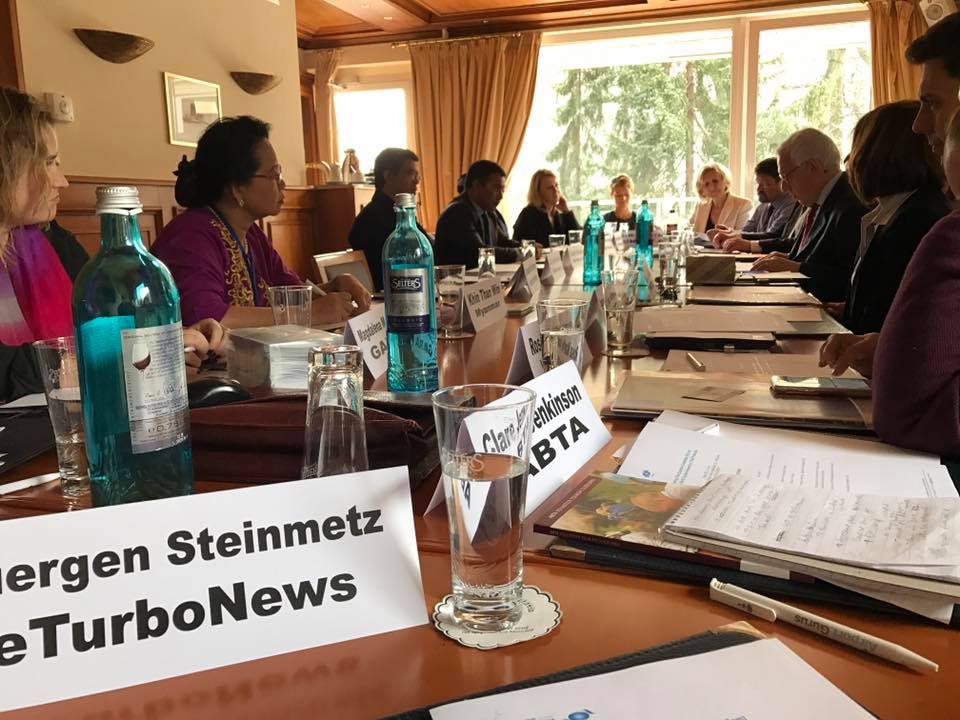
World Tourism Network on Child Protection Executive Committee meets in Berlin
Today in Berlin at Villa Kastaia hotel the Executive Committee (ExCom) of the World Tourism Network on Child Protection by UNWTO had it’s yearly meeting on the sideline of ITB Berlin.
Attending
Chair
Carol Bellamy
Governments
H.E. Najib Balala, Minister of Tourism of Kenya
Widad Sherman, Chief of Staff, Ministry of Tourism, Kenya
Tokiaritefy Rabeson, General Director of Tourism Development, Ministry of Tourism, Madagascar
Khin Than Win, Deputy Director General, Ministry of Hotels and Tourism, Myanmar
Zeyar Myo Aung, Director, Tourism Promotion, Ministry of Hotels and Tourism, Myanmar
Magdalena Montero, Adviser to the Minister of Tourism of Uruguay and Representative of the Regional Task Force for the Protection of Children in Travel and Tourism of the Americas (GARA)
Law Enforcement
Mohamed Basheer, Chief Inspector, Head of Family and Child Protection Department, Maldives Police Service
Private sector
Arnaud Herrmann, VP Sustainable Development, Accor Hotels
Andreas Mueseler, Chairman of the Sustainability Committee, German Travel Association (DRV)
Nikki White, Head of Destinations and Sustainability, ABTA
Elise Allart, Manager of Sustainable Development, TUI Benelux & TUI Group 2
Civil Society/NGOs
Joanna Rubinstein, President & CEO, World Childhood Foundation USA
Dorothy Rozga, Executive Director, ECPAT International
Rosa Martha Brown, President and Founder of Infantia Foundation & International Federation of Executive Women in Travel (FIASEET), Mexico
Media
Juergen Steinmetz, Publisher and President, eTurboNews
International Organizations
Beth Verhey, Senior Advisor, Children’s Rights and Business, UNICEF
Simon Steyne, Senior Adviser of the Fundamental Principles and Rights at Work, ILO
UNWTO Secretariat
Márcio Favilla L. de Paula, Executive Director
Marina Diotallevi, Head, Ethics and Social Responsibility Programme
Igor Stefanovic, Senior Programme Assistant, Ethics and Social Responsibility
Observer
Ms. Alice Akunga, Country Representative, UNICEF Maldives
After welcoming remarks by Márcio Favilla L. de Paula, Executive Director, UNWTO, discussed was the upcoming special session at ITB 2017 entitled; Governments as champions of child protection in tourism
Uruguay presented best practices on Tourism and prevention of sexual exploitation of children in the Americas
The Modern Slavery Act and its implications for tourism industry stakeholders was introduced by ABTA. The Approach of the Association of British Travel Agents (ABTA) had an interesting program among its members
Further discussed: Best practices by ExCom participants: Putting child protection in the context of the Int’l Year of Sustainable Tourism for Development / implementation of Sustainable Development Goals (SDGs)
Advancing youth empowerment through travel and tourism: UNWTO/Amadeus/Government of Kenya pilot project in Nairobi
